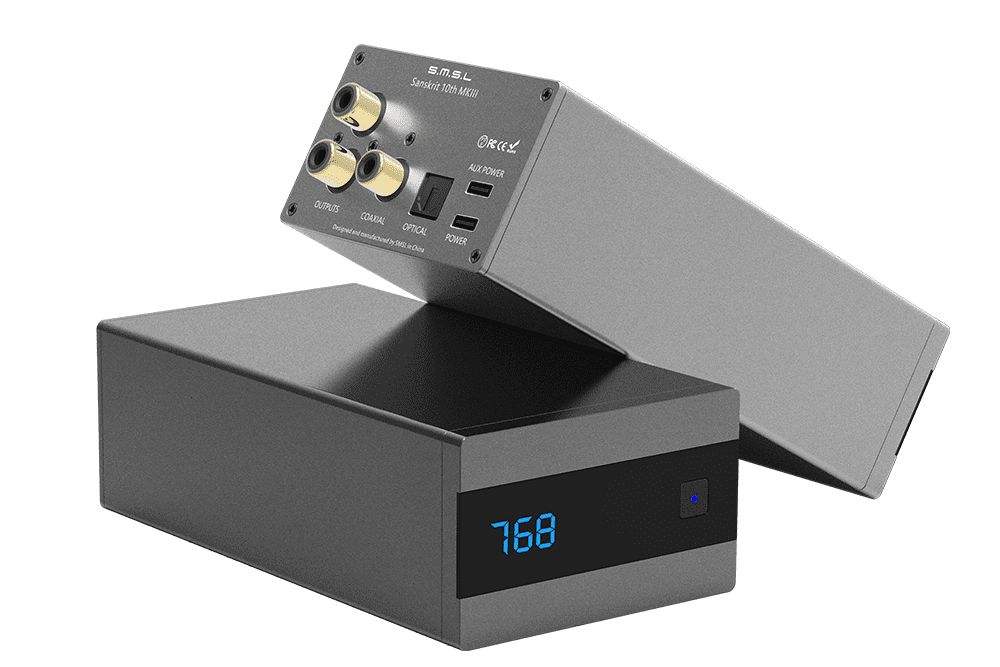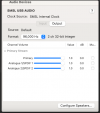I had both. For me SMSL is better.E30 or this ?
-
WANTED: Happy members who like to discuss audio and other topics related to our interest. Desire to learn and share knowledge of science required. There are many reviews of audio hardware and expert members to help answer your questions. Click here to have your audio equipment measured for free!
- Forums
- Audio, Audio, Audio!
- DACs, Streamers, Servers, Players, Audio Interface
- Digital To Analog (DAC) Reviews and Discussion
You are using an out of date browser. It may not display this or other websites correctly.
You should upgrade or use an alternative browser.
You should upgrade or use an alternative browser.
SMSL Sanskrit 10th MK II DAC Review
- Thread starter amirm
- Start date
Veri
Master Contributor
- Joined
- Feb 6, 2018
- Messages
- 9,598
- Likes
- 12,040
New Sanskrit MK III

 shenzhenaudio.com
shenzhenaudio.com

S.M.S.L Sanskrit 10th MKIII AK4493S Digital to Analog Convertor (DAC)
Features: Ultra-tiny shape design and supports a variety of placement ways ; The latest XMOS XU-316 solution supports sampling rate up to 32bit/768KHz and DSD512 ; The new self-developed CK-03 clock processing circuit greatly reduces clock jitter; One pieces of AKM's new AK4493S ch...
Can't wait for Amir's review.New Sanskrit MK III

S.M.S.L Sanskrit 10th MKIII AK4493S Digital to Analog Convertor (DAC)
Features: Ultra-tiny shape design and supports a variety of placement ways ; The latest XMOS XU-316 solution supports sampling rate up to 32bit/768KHz and DSD512 ; The new self-developed CK-03 clock processing circuit greatly reduces clock jitter; One pieces of AKM's new AK4493S ch...shenzhenaudio.com
Saponetto
Active Member
Had a SK 10 MkII in 2020, good performances but after a a few weeks right channel started to distort a lot.
It seems that SMSL still has QC problems in their budget DACs, and this is a true pity...
It seems that SMSL still has QC problems in their budget DACs, and this is a true pity...
I recently got the Sanskrit 10 and it was working fine until today when the usb i/power input stopped working with my Mac.
No sound. The optical input is still functioning. No problem with my other usb dacs.
Any advice or comments?
Maybe a driver issue? Try it with another machine or reinstall drivers
The driver download is Windows only.Maybe a driver issue? Try it with another machine or reinstall drivers
Mine does make a buzz sound when the lcd is acitve. System is raspi4 -> smsl usb input (no aux power), smsl -> exposure 2010 -> monitor audio gold 100. This buzzing doesn't appear when I use dac with my laptop, violectric amp and he560.
What could be the cause, should I connect ground of dac and amp together?
What could be the cause, should I connect ground of dac and amp together?
What filter has more soundstage in your opinion, I don't note huge differences.This dac is impressive, I like the sound regardless the price. However unlike the other dac I hear a lot the filter differences, specially soundstage, edges.
I have the MK2 and now mk3, I like the Mk3. Mk3 has six filter I tend to prefer the filter number 2, but I don't know if in a blind test I can recognize a filter from other.
Last edited:
I don't think double blind tests are always the best. When you go for an eye test, there gets to a point where they are switching back and fourth between lenses asking "which is sharper, A or B" and I have to reply "I'm not sure, A is making the letters darker and bolder, but B, although not as bold, seems finer and sharper, but I can't really say which is technically sharper, but I prefer B." Now, if you took me out of the room, brought me back in, sat me down and asked me which lens was in, A or B, I'd probably be guessing, but when comparing the, the difference is clearly there. I think it's the same for most things. I'm an editor and show people two images with slightly different colour grading and you can clearly see subtle differences when switching between them or even putting them side by side, but a few minutes later ask a person to tell you which one they are looking at, grade A or grade B in isolation and they would be guessing with their answer. I also belive that the brain need cues to allocate more processing power. Research shows that “Entering or exiting through a doorway serves as an 'event boundary' in the mind, which separates episodes of activity and files them away." This results in you thinking "why did I come in here" and when you return back through the door, you remember. I think this same sort of thing is happening when we listen and analyse sound. I belive the small changes that gear can bring will most of the time be missed, because our brain is choosing to ignore them, or more so it's not analysing the sound as deeply, because it has lots more things to be getting on with. So, switching between gear, subtle differences would be missed if the brain is not aware a switch has taken place, but if you actually tell the brain you are switching, it analyses more deeply and picks up on those subtle differences. So the knowledge of a switch, is like the door, setting an "event boundary." I wish I were a scientist, so I could work out how to test this hypothesis. I think A+B switching, not knowing which device is A or which is B can be valuable. then repeat the same test not knowing if A & B are still the same devices. Run this test several times to see if you get the same results. Double blind ABX tests will always fail if my assumption about how the brain reacts to knowledge of switching is correct. Maybe I'll die never knowing.What filter has more soundstage in your opinion, I don't note huge differences.
I have the MK2 and now mk3, I like the Mk3. Mk3 has six filter I tend to prefer the filter number 2, but I don't know if in a blind test I can recognize a filter from other.
I like the filter 5, the most natural sounding to my ears, 1-3 for me with the narrower stage. Note, I use headphones.What filter has more soundstage in your opinion, I don't note huge differences.
I have the MK2 and now mk3, I like the Mk3. Mk3 has six filter I tend to prefer the filter number 2, but I don't know if in a blind test I can recognize a filter from other.
I tried with an external power (2A), than laptop, not sure is better, maybe a little bottom end, however if I don't hear it, I don't need it.
How is the Mk3 versus Mk2, worth the upgrade?
Last edited:
In my opinion yes, greater clarity both in the lower and high frequencies, but you do not think of differences as between night and day. The sensation with my Adam t5v of a bit more larger soundstage.How is the Mk3 versus Mk2, worth the upgrade?
Last edited:
Btw, I spoke with Gabriel Radvansky and he found my hypothesis interesting. He believes the knowledge of switching between devices would indeed act as an 'event boundary', which would be a cue for the brain to pay more attention and gather more information. However, he says at an event boundary, some information from before the event is also loss, so it would still be unclear if the audio quality had improved or not, because the lost information from before the switch could account for the sound difference as much as the new information gathered after the switch!I don't think double blind tests are always the best. When you go for an eye test, there gets to a point where they are switching back and fourth between lenses asking "which is sharper, A or B" and I have to reply "I'm not sure, A is making the letters darker and bolder, but B, although not as bold, seems finer and sharper, but I can't really say which is technically sharper, but I prefer B." Now, if you took me out of the room, brought me back in, sat me down and asked me which lens was in, A or B, I'd probably be guessing, but when comparing the, the difference is clearly there. I think it's the same for most things. I'm an editor and show people two images with slightly different colour grading and you can clearly see subtle differences when switching between them or even putting them side by side, but a few minutes later ask a person to tell you which one they are looking at, grade A or grade B in isolation and they would be guessing with their answer. I also belive that the brain need cues to allocate more processing power. Research shows that “Entering or exiting through a doorway serves as an 'event boundary' in the mind, which separates episodes of activity and files them away." This results in you thinking "why did I come in here" and when you return back through the door, you remember. I think this same sort of thing is happening when we listen and analyse sound. I belive the small changes that gear can bring will most of the time be missed, because our brain is choosing to ignore them, or more so it's not analysing the sound as deeply, because it has lots more things to be getting on with. So, switching between gear, subtle differences would be missed if the brain is not aware a switch has taken place, but if you actually tell the brain you are switching, it analyses more deeply and picks up on those subtle differences. So the knowledge of a switch, is like the door, setting an "event boundary." I wish I were a scientist, so I could work out how to test this hypothesis. I think A+B switching, not knowing which device is A or which is B can be valuable. then repeat the same test not knowing if A & B are still the same devices. Run this test several times to see if you get the same results. Double blind ABX tests will always fail if my assumption about how the brain reacts to knowledge of switching is correct. Maybe I'll die never knowing.
So, it would seem that people who say they 100% hear a difference when switching between gear are not lying, or even imagining it, as in a placebo type way, their brains are simply evaluating new info and dumping old info. However, the difference in the audio may not have actually have changed. Is this 'event boundary' phenomenon been discussed with regards to audio perception before?
This could have implications when editing or mixing music as well as other creative pursuits. Say you are switching between and EQ setting and bypass to evaluate if it sounds better with the EQ switched in or out, which is what mixing engineers do all the time. How can they trust that one thing does sound better, especially when making subtle changes like mastering engineers do. They tweak things by 0.5dB etc. I wonder if rapid switching multiple times gets around this boundary event issue?
Last edited:
Similar threads
- Poll
- Replies
- 257
- Views
- 68K
- Replies
- 0
- Views
- 1K
- Replies
- 13
- Views
- 700
- Replies
- 713
- Views
- 238K

